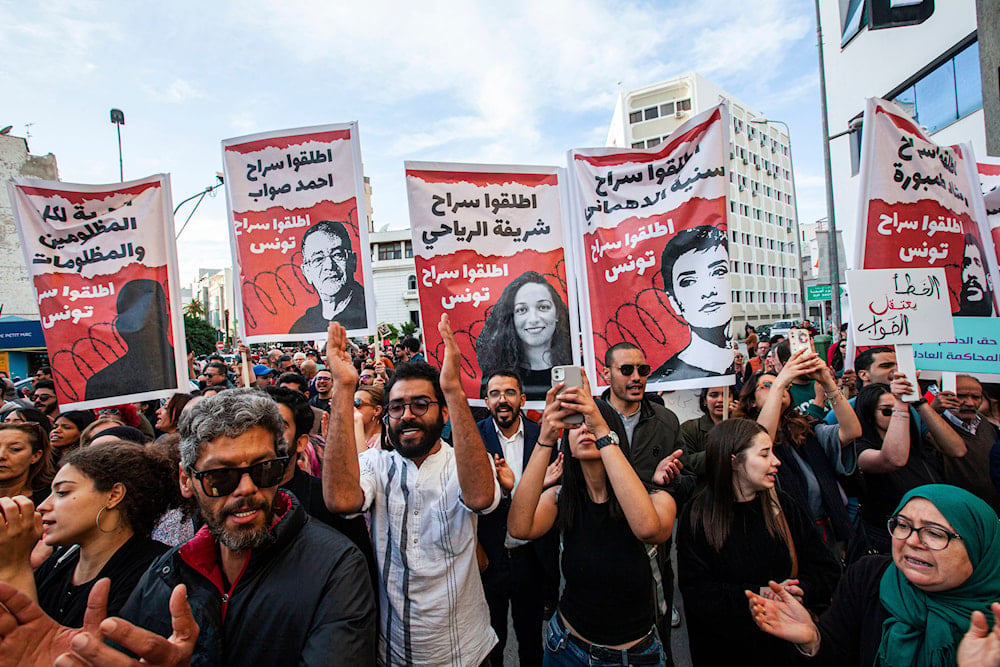Tunisian opposition leader gets 2 more years in jail
Tunisian figure Abir Moussi receives another prison sentence under Decree 54 as President Kais Saied intensifies the crackdown on Tunisia’s opposition and political dissent.
-

Supporters demonstrate in solidarity with Ahmed Souab, former president of the Administrative Court and a defense lawyer, who was arrested on terrorism-related charges, in Tunis, Tunisia, Friday, April 25, 2025. (AP)
Tunisian opposition figure Abir Moussi, who is already jailed, received an additional two-year prison sentence on Thursday under a presidential decree after being accused of criticising the electoral commission.
The leader of the Free Destourian Party, which some accuse of aiming to reinstate the authoritarian regime overturned during Tunisia’s 2011 Arab Spring uprising, has been a vocal opponent of President Kais Saied. She has been in detention since her arrest in October 2023 outside the presidential palace, where her party claims she was attempting to file legal challenges against Saied’s decrees.
Lawyer Nafaa Laribi, referencing the Independent High Authority for Elections (ISIE), explained that the court had deemed Moussi's 2022 remarks about the electoral body as criminal, while her lawyers noted that during a press conference that year, she had denounced the electoral process as unlawful and manipulated by the ISIE.
Moussi, who had aspired to compete in the previous year's presidential election, finished serving a 16-month prison term on May 26 in a separate case that likewise originated from a complaint filed by the ISIE.
Under Decree 54, a 2022 law implemented by Saied to target alleged misinformation, Moussi initially received a two-year prison sentence in August 2024 before having it reduced on appeal, with her lawyer asserting that the court hastened to reimpose the penalty in order to ensure her continued detention.
Moussi faces allegations of grave offenses such as "attempting to alter the system of governance," with critics suspecting her of seeking to revive the autocratic rule of ousted former president Zine El Abidine Ben Ali, who was toppled during Tunisia's 2011 uprising.
This comes amid rising tensions in Tunisia, which has been witnessing a widespread crackdown on opposition figures, prompting protests against the President, Kais Saied, accusing him of authoritarian rule.
Opposition protests erupt in Tunisia over mass arrests
On May 1, protesters opposing Tunisian President Kais Saied marched through Tunis, condemning what they viewed as his government's growing authoritarian tendencies, while supporters simultaneously organized a rival demonstration that highlighted the nation's escalating political polarization.
The opposition demonstration was organized in reaction to what opposition groups describe as intensifying government repression in Tunisia, coming after lawyer and former judge Ahymed Souab's arrest and the convictions of multiple opposition leaders on alleged conspiracy offenses.
Souab was detained on the same day under Tunisia's anti-terrorism legislation following his strong condemnation of the mass trial that resulted in 37 opposition figures being sentenced, with him openly dismissing the high-profile "conspiracy against state security" case as a sham while asserting that the judicial system had been entirely dismantled.
On April 19, Tunisian media reported that a court had handed down prison sentences varying between 13 and 66 years to multiple defendants, among them high-profile opposition members, for purported violations of national security.
On February 5, 2025, a Tunisian court handed down prison sentences and fines to politicians and media figures in the high-profile "Instalingo" case, which involved a digital content company accused of wielding political and media influence, with most defendants affiliated with the Ennahda movement.
Among the most significant verdicts was the sentencing of Rached Ghannouchi, the 83-year-old leader of Tunisia's Ennahda party, to an additional 22 years in prison on charges of "plotting against state security," with his lawyers denouncing the ruling as "harsh" and announcing plans to appeal.

 4 Min Read
4 Min Read










